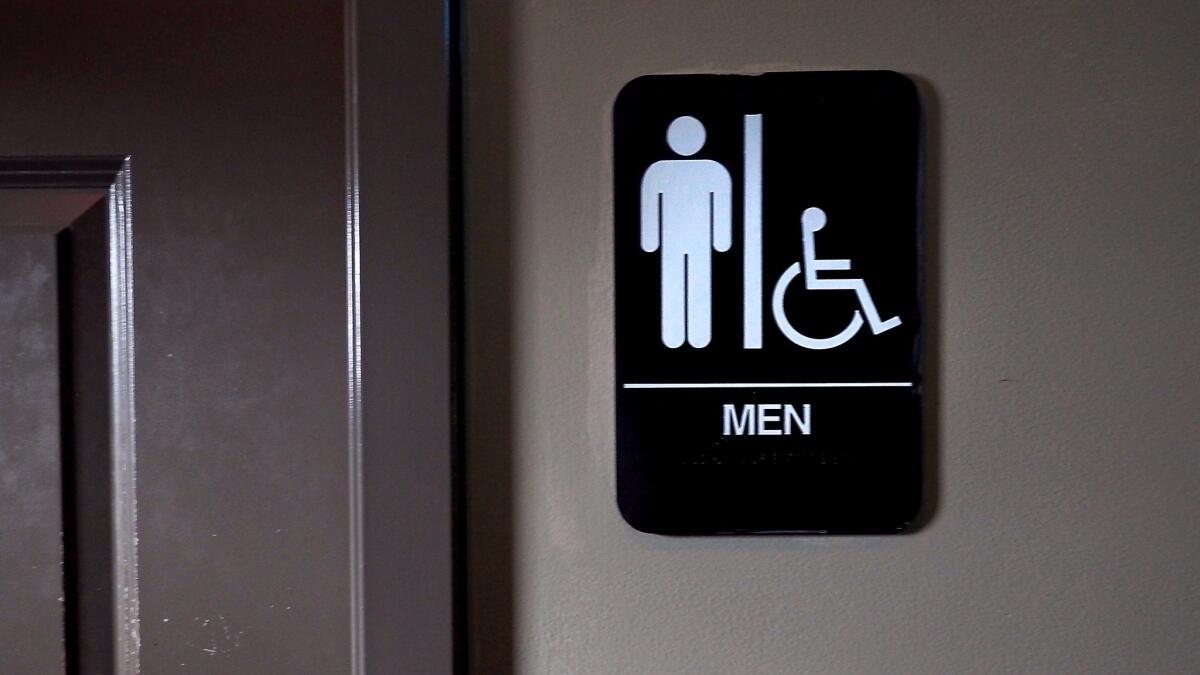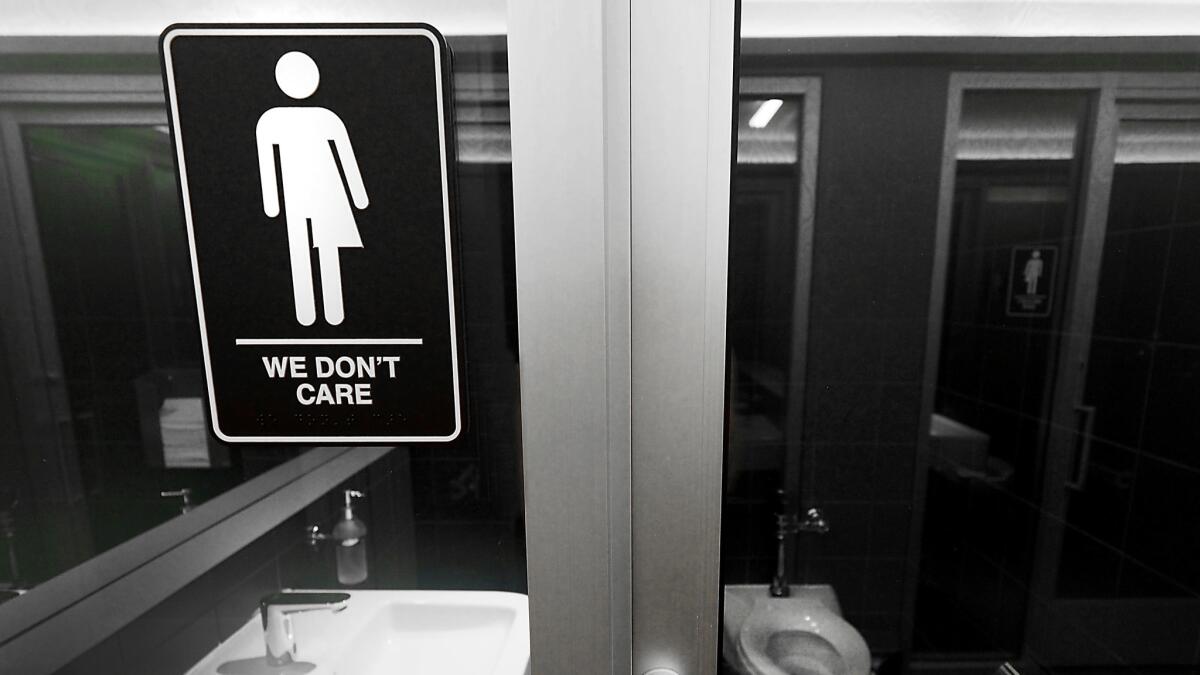What it’s like to live under North Carolina’s bathroom law if you’re transgender

- Share via
Going to the bathroom in public makes Payton McGarry nervous now. He’s worried somebody will confront him. Or, worse, attack him. So before he leaves his apartment, he asks himself: “Have I drunk too much water today?”
That’s because McGarry, a 20-year-old student at the University of North Carolina in Greensboro, is a transgender man. But because his birth certificate says he’s female, North Carolina law says it’s illegal for him to use the men’s room at school.
“I really try not to go to the bathroom at all,” McGarry said. “When I was still in school for the semester, I literally had to walk two buildings down to legally use the restroom, and that’s the kind of situation transgender people are being put in all over the place now.”
See the most-read stories this hour >>
On March 23, North Carolina became the first state in the country to ban people from using government-owned restrooms and locker rooms that don’t match the gender written on their birth certificates.
Since then, transgender North Carolinians interviewed by the Los Angeles Times say that going to public bathrooms has become an inconvenience and a conundrum, a daily choice between risking their personal safety or breaking the law.
Transgender women seem to have largely ignored the law for fear of being attacked or sexually assaulted in the men’s room. Some transgender men have gone into women’s rooms to avoid prosecution, or as a protest -- to create the kind of awkward situations that conservative lawmakers had intended to avoid.

Some transgender North Carolinians even plan their entire days around future bathroom trips or avoid public restrooms altogether, like McGarry, saying debate around House Bill 2 has brought a new climate of fear to the state.
McGarry, who is suing the state and the University of North Carolina system over the bathroom bill, wants to be a lawyer someday, so he wants to follow the law. But between going to the men’s room where he fits in or going to the women’s room where he sticks out, the choice is clear.
“This is a situation where I’m choosing between safety or breaking the law, and I’m going to choose my safety every time,” McGarry said. “So I go to the male restroom.”
Join the conversation on Facebook >>
North Carolina has become the epicenter of a national battle over transgender rights since the city of Charlotte passed an ordinance in February barring discrimination against gay, lesbian, bisexual and transgender people. State Republican lawmakers immediately recoiled -- claiming Charlotte’s law allowed men and potential sexual predators into women’s bathrooms -- and responded by passing House Bill 2, which also overrides local nondiscrimination packages like Charlotte’s.
Bathrooms have long been a source of anxiety for transgender men and women whose gender transitions are in progress. As their appearances change, it can be difficult to know when it’s best to stop using one gender’s bathroom and start using another.
Restrooms can even be dangerous. Seventy percent of transgender people have been attacked, harassed or denied access to a bathroom, according to a survey conducted in Washington, D.C., and published in the Journal of Public Management and Social Policy in 2013.
House Bill 2, which has drawn boycotts and lawsuits, has added institutional pressure to the mix.
Ethan Mayo, 18, started his gender transition this year, and he struggled over the right time to switch bathrooms. He started using the men’s room at his Charlotte, N.C., high school when he started “getting more weird looks in the girls’ bathroom.”
“I didn’t want to feel out of place, I guess,” Mayo said.
But House Bill 2 was passed not long after Mayo began using the men’s room, and he said another student complained. After a teacher quizzed him about his bathroom habits, Mayo said, the school’s administration quietly urged him to use a single-person restroom on campus.
“I was just ticked off,” said Mayo, who was set to graduate Saturday. “I was kind of just hoping I could go as long as possible without getting caught. I knew I wasn’t doing anything wrong.”
The law has also been a source of worry for transgender North Carolinians who don’t have what’s often called “passing privilege” – the ability to not stick out as transgender.
Before the law’s passage, using the men’s room came naturally to Joaquin Carcano, 27, an employee of the University of North Carolina in Chapel Hill.
Carcano has some facial hair. But, he said, “There’s definitely times I don’t pass.” Now, “there are times where I walk to the men’s restroom and before I went in, [I think], ‘Oh, wait, this law exists, there are restrictions.’”
Carcano didn’t want to risk losing his job, so he began using a gender-neutral bathroom in a hospital next to his workplace. He recently discovered that his building, which is six stories, has one single-use bathroom – in the basement, for maintenance staff.
Carcano is now suing the state as part of the same lawsuit with McGarry. The head of the state’s university system, Margaret Spellings, said in May that she will not enforce the law until the lawsuit has been resolved.
Schools aren’t the only danger zones. Terri Phoenix, the director of the LGBTQ Center at the University of North Carolina in Chapel Hill, uses the women’s restroom when he’s traveling in more conservative parts of the state because that’s the gender listed on his driver’s license.
Many transgender people interviewed by The Times said they weren’t afraid of prosecution because House Bill 2 doesn’t specify a punishment for breaking the law. But Phoenix says that same ambiguity worried him.
“I don’t pass well as a guy,” Phoenix said. What if a rural sheriff tried to arrest him for, say, indecent exposure at a public restroom? “If I get challenged, I need to be able to show that I have the correct driver’s license in order to be in the bathroom.”
Others say following the law creates the kind of awkward situations the state purported to be legislating against.
August Branch, 25, of Greenville, has a full beard. But as a transgender man, he is legally supposed to use the women’s bathroom when he gives workshops on transgender issues at East Carolina University.
So, Branch has sometimes used the women’s room -- as a political statement.
“It makes everybody uncomfortable,” Branch said. “For me in general, it’s safer to use the men’s room.… I’m, like, a 200-pound bearded guy. That’s the bathroom I should be using.”

Many transgender women would rather play it safe -- often fearing bathroom vigilantism by private citizens more than punishment for breaking the law.
“Every day I’m in dresses and tight clothing with a full face of makeup,” said Angie Mullowney, 20, of Raleigh, a transgender woman who was attending North Carolina State University when the new law was passed. “If I were to use the men’s room, I would be putting myself in physical harm, or putting myself in a situation where I could be sexually assaulted, and there’s no way I’m going to be doing that.”
Kaylin Mercer, a 21-year-old North Carolina State University student, says she passes so well that many people don’t know she’s transgender, so she largely ignores the law with “no fear whatsoever.”
Erica Lachowitz, a 40-year-old transgender woman and advocate in Charlotte, said, “I would rather go to prison, receive a civil fine, than put myself at risk” by going into a men’s room.
There have been some other unexpected side effects. Roberta Dunn, a 72-year-old transgender advocate who lives outside Charlotte, talked to her lawyer about getting her birth certificate changed – just in case.
Lily Carollo, an incoming 24-year-old journalism graduate student at the University of North Carolina in Chapel Hill, recently saw her therapist for the first time in months because she was getting “so stressed out” by the public debate around the law.
In at least one case, House Bill 2 has been life-altering.
At work, Lacy Norrice, 44, looks like a man, talks like a man, goes by a man’s name. That’s how Norrice was born, but it’s not how Norrice wants to live. Norrice calls it “male mode.”
At night, she changes into women’s clothes and goes out as Lacy, a transgender woman – Norrice’s “true self.”
“My wife knows, my daughter knows about me, my son does not. He’s 10,” Norrice said. “I’ve struggled with my feminine side since I was 5 years old, and pretty much growing up, I knew I was different.”
But Norrice, who works at a consulting company in the Piedmont Triad area, said the blanket ban on discrimination protections will probably force her to delay her long-awaited physical transition to a woman. She’s afraid she’ll be punished once she comes out as transgender at work.
With House Bill 2, “I can be discriminated against and fired, and I have no legal course of actions in the state of North Carolina,” Norrice said. “I can’t afford to put my family in that situation.”
Email: [email protected]
Follow me on Twitter: @mattdpearce
MORE NATIONAL NEWS
American Samoans demand Supreme Court finally grant them full citizenship
Orlando gunman had been investigated twice for terror ties, but was able to legally buy two guns
More to Read
Sign up for Essential California
The most important California stories and recommendations in your inbox every morning.
You may occasionally receive promotional content from the Los Angeles Times.











